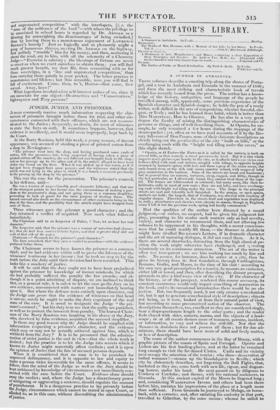JUDGES, JURIES, AND PRISONERS.
JUDGES commonly receive much information respecting the cha- racters of prisoners brought before them Ibr trial, and other cir- cumstances connected with their offences, ‘vhich are not commu- nicated to the Juries ; frequently, no doubt, for want of witnesses to state the fuels on oath. It sometiines happens, however, that evidence is ticedlessly, and it would seem improperly, kept back by the Court.
At the Surry Sessions, held this week, a young woman, of decent appearance, was accused of stealing a piece of printed cotton from a shop in Newington—
"The prisoner went into the shop, and having purchased some yards of cotton, left the premises ; but, being smpeeted of having taken a piece of printed cotton MT the counter, she was fidlowed and brought back to the shop ; and on her passage up to the other end of it, the article alleged to have been stolen was tbund on the door. When it was picked up it was warm, as if it had just been dropped from some person ; and the witnesses stated that the article was not lying in the place ii. which it was found, a moment previously to the passing up the shop by the prironer."
This was the case for the prosecution. The prisoner's counsel, in her defence, said— She was a woman of nogoestionahly good character hitherto; and that one of the strongest points in her fitrottr was the circumstance of making a pur- chase at the prosecutor's shop, and not going there as a common shoplirter, pretending to look at goods tbr the mere purpose of stealing them. The learned counsel also dwelt on the circumstance oh other customers being in the shop at the time, and the possibility that the article might have dropped from sonic of therm
Three witnesses gave the prisoner a good character ; and the Jury returned a verdict of acquittal. Now mark what followed immediately. The Chairman said to an Inspector of Police, " Now, let us hear her real character."
The Inspector said, that the prisoner was a woman q/' noliwions had Mame. tee; that she had been convicted twice /,r/ire, awl that a !yell ter thiV did hot exist at Owl side if the water.
Clutirman—" So much the the prisoner's good character."
The Jury remarked, that they gave a verdict in accordance witlt the evidence produced before them.
The Chairman seems to have known the prisoner as a common thief; and he had evidence within call to prove the fitlseness of the wituesses' testimony in her favour ; but he took no step to lay the truth before the Jury until their decision load been recorded. This looks like a mockery of justice.
It will he said that the Jury ought not to have been prejudiced against the prisoner by knowledge of former misdeeds, for which she had probably sulThred the penalty the law awards ; and al- though it is a point admitting of dispute, we are inclined to think that, as a general rule, it is safest to let the case go the Jury on its own evidence, unconnected with matters not immediately bearing upon it. But where the defence rests entirely upon character, and the Judge can prove that the evidence of witnesses on that head is untrue, surely he ought to make the Jury cognizant of the real state of the ease. It is usual to designate the Judge " the pri- soner's counsel ; " but his duty is to see that the guilty are punished, as well as to protect the innocent from penalty. The learned Chair- man of the Sorry Sessions was laughing in his sleeve at the jury, who, deceived by false evidence, acquitted the accused shoplifter. Is there any good reason why the Judge should be supplied with information respecting a prisoner's character, and the evidence which may or may not be actually adduced against him, which is Withheld from the Jury ? It is to be presumed that the adminis- tration of strict justice is the end in view—that the whole truth is desired ; but the practice is to let the Judge into secrets which if known to Juries might materially affect verdicts ; and it is upon the opinion of Juries that the fate of accused persons depends. When it is considered that no man is to be punished for unproved delinquency, and it is opposite to law and equity to make a person twice answerable for the same offence, it seems to follow, that the mind of' the Judge as well as the Jury should be kept unbiassed by knowledge of circumstances not immediately con- nected with the case before the Court. Esidence alone should sway the verdict; and, where the Judge has a discretionary power of mitigating or aggravating a sentence, should regulate the amount of punishment. It is a dangerous practice to lay privately before the Judge, circumstances which cannot be stated in open Court, or alluded to, as in this case, without discrediting the administration ofjustice.


























 Previous page
Previous page